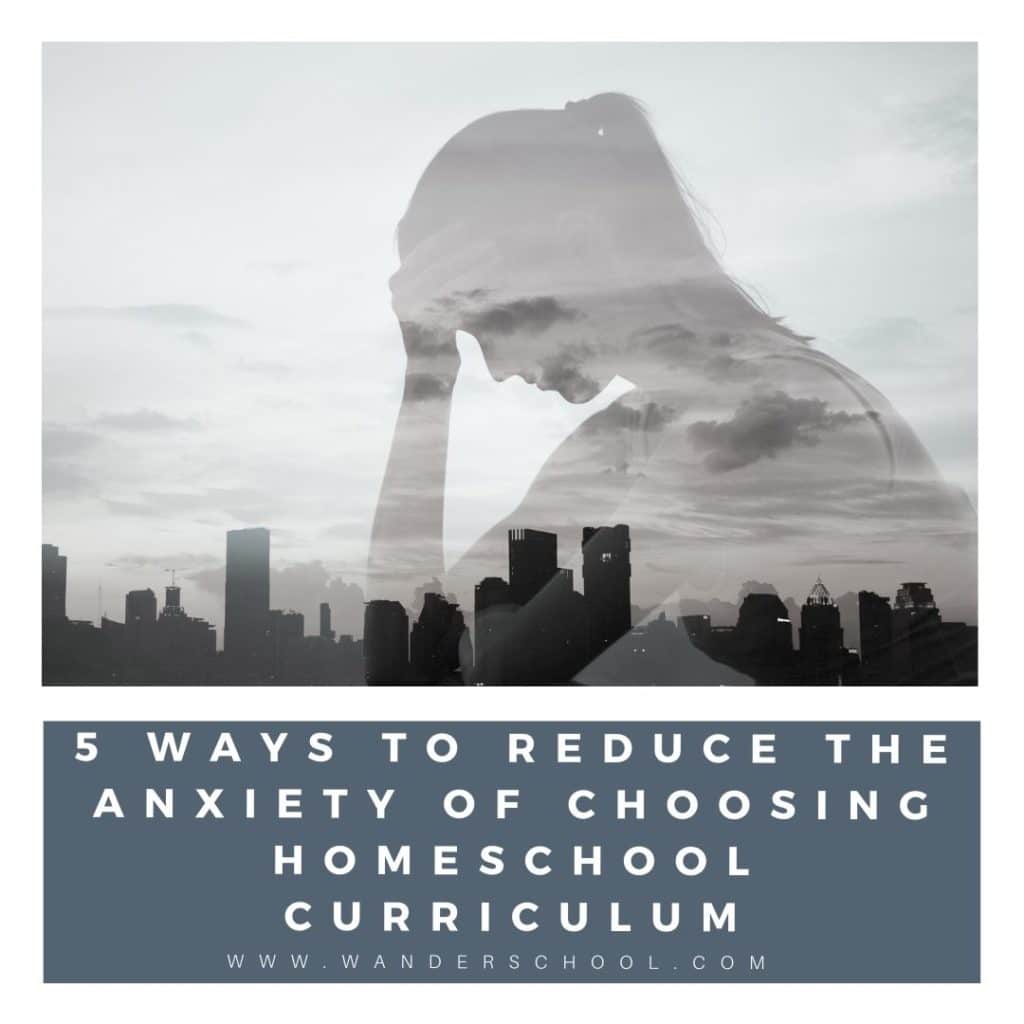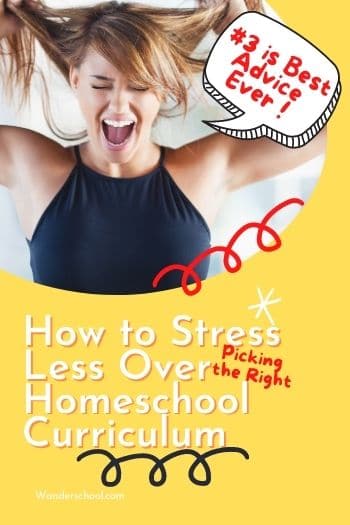
Hello, homeschool stress overload! It’s choosing homeschool curriculum time.
If you’re stressing out over choosing homeschool curriculum, keep reading because I’m going to let you in on 5 Ways to Reduce The Anxiety of Choosing Homeschool Curriculum.
Affiliate Links Disclosure: My posts sometimes contain affiliate links, which mean that if you click on them and make a purchase or sign up for an offering, I may earn a commission, at no added cost to you. I received no compensation for writing this post, and it reflects my own experiences, research, and opinions. You can read my my privacy policy here. Thank you so very much for reading my blog!
The ‘Right’ Curriculum
Choosing homeschool curriculum can be incredibly stressful.
There’s so much pressure to choose the “right” curriculum. Or the best curriculum. Pressure not to mess “it” up.
And pressure to not mess up your children or their education by your choice.
Of course, there’s also pressure to keep your children on track–whatever that “track” is.
And, for those who are considering homeschooling as a temporary measure, there’s also pressure to make sure that the chosen curriculum will allow children to integrate back into school at the “right” level, if, and when, the time comes.
Stressing About Choosing the Right Homeschool Curriculum
I can’t begin to tell you how many hours (days, weeks, or months probably) of my life I’ve wasted over the years stressing out about picking the “right” homeschool curriculum for my kids.
To think about all of the tears I shed over the years, especially in those first months and years, agonizing over homeschool curriculum decisions (really, homeschooling every single, little thing kind of decisions)…. I was so afraid of choosing the wrong curriculum. Afraid that my kids would fall behind, not learn enough, learn the wrong things, learn in the wrong sequence, or not learn fast enough, afraid they would be or wouldn’t be ready for college admission tests….
Stressing: A Rite of Passage
Perhaps stressing about curriculum selection is some sort of homeschooling parent rite of passage. But I’m going to tell you this. It shouldn’t be.
Choosing curriculum is not worth stressing out about.
Really.
Stressing about picking the right homeschool curriculum isn’t worth losing tears. It’s not worth losing sleep. It’s definitely not worth losing your mind–or losing your financial peace of mind (or adding to money worries).
Choosing homeschool curriculum for your children can cause real anxiety. There are so many options, philosophies, approaches, and costs to consider. And then there’s trying to weigh a child’s personality, needs, the broader family’s needs, and a parent’s availability and/or willingness “to teach,” “direct,” or “oversee” the curriculum.
Keep reading to learn 5 Ways to Reduce The Anxiety of Choosing Homeschool Curriculum.
Children Will Naturally Learn, They Want to Learn
Why? Because if you’re invested in your child’s education, well-being, and positive growth, and give your child support and space to flourish, your child is going to learn regardless of the curriculum you choose.
John Holt, an American Educator and proponent of homeschooling and unschooling, argued that children are natural born learners. They are naturally curious and want to understand the world around them. By their very nature, humans are learners.
“Birds fly; fish swim; humans think and learn. Therefore, we do not need to motivate children into learning by wheedling, bribing, or bullying. We do not need to keep picking away at their minds to make sure they are learning. What we need to do — and all we need to do — is to give children as much help and guidance as they need and ask for, listen respectfully when they feel like talking, and then get out of the way. We can trust them to do the rest.”
-John Holt
5 Ways to Reduce The Anxiety of Choosing Homeschool Curriculum.
If you’re stressing big time about choosing homeschool curriculum, and I’m guessing you probably are since you’re still reading, let me tell you that there are 5 ways to reduce the anxiety of choosing homeschool curriculum.
Of course, there are more ways to reduce anxiety, too. But these are 5 ways that can work wonders when it comes to deciding on curriculum.
Really. You can reduce, if not get rid of this stress!
These 5 Ways to Reduce The Anxiety of Choosing Homeschool Curriculum Work!
No, I’m not a doctor. I’m definitely not an anxiety expert. But as a homeschooling mom of four, who has been in the homeschooling game for many years, I know it’s stressful choosing the ‘right’ or ‘perfect’ homeschool curriculum.
Choosing homeschool curriculum can feel like a loaded choice. It can seem like–feel like–there is so much hanging on your choice. So much at stake.
Your child’s education. Certainly, your child’s happiness. Also, your happiness and your sanity. Your household balance and harmony. And, let us not forget, your bank account.
Oh, and there’s probably a little bit of healthy ego mixed in there. As in, I can’t fail at this.
So, how do you reduce this anxiety?
Here’s how.
Here’s How to Stop Stressing About Homeschool Curriculum
The 5 Ways to Reduce The Anxiety of Choosing Homeschool Curriculum….
1. Trust. Meaning Trust Your Child, Trust Yourself.
You may have to dig deep here. As in, you have to trust in your child’s ability to learn. You have to trust in their innate desire and ability to figure out their world. You may have to blindly trust, until you trust.
Children are like sponges. They want to learn and soak everything up. The way they do this may not look like the way you want them to. It may not resemble the way you expect them to learn. The way they learn may not match the way schools or teachers want or expect them to learn, but they will learn.
It might be on their own schedule, but they will learn.
The Curriculum You Choose
Children can’t help but learn. Learning is what humans do.
So, it really doesn’t matter what curriculum you choose. Your child is going to learn. It’s inevitable.
Certainly, children will likely learn best when parents are attuned to their needs, learning styles, personalities, attention spans, and interests.
Of course, if a parent picks curriculum that quashes a child’s spirit or discourages their natural sense of wonder, that’s probably going to impact learning.
At the very least, it’s probably going to impact hoped for learning. Also, if a parent chooses curriculum that doesn’t mesh with a child’s personality or learning style (or needs), what the child learns might not be what the parent hopes they learn.
But the child will learn. It might be a negative or damaging lesson, however. But the child is going to acquire knowledge. The child will also acquire a better understanding of his/her world. And his/her place in that world.
Trusting Your Child
Trusting our kids, trusting that homeschooling works, and that kids by nature want to learn is not always easy. Tell me about it.
This trust doesn’t always come easy. This is especially so when we’re brand new to starting out on the homeschooling path. In many ways, the trust that lends itself to homeschooling has been stifled or buried as a product of our own education; education that all too often discouraged us from trusting ourselves in the first place.
Trust Issues
It’s not always easy to trust organic, natural, child-led learning when you, yourself, are a product of schools. Somehow schooling has taught most people that schools are the only place where children can be educated. Ironically, however, if schools are where the learning magic happens and they’ve done their job educating, then parents who are products of schools should have the knowledge needed to educate their own.
Sometimes it’s difficult to trust the homeschool process. It can be difficult to trust from within a society that believes the only way to truly learn is within classrooms. It can also be difficult to trust natural learning processes when “out of the box” education is a new or foreign concept, like unschooling, worldschooling, or roadschooling.
Trusting Yourself
Beyond trusting your child, reducing stress over curriculum selection also involves trusting yourself.
It means trusting that you’re going to figure this all out. As well, it means that you’re going to figure out how homeschooling works. You’re going to figure out what curriculum and materials will work for your child and family.
Also, it means trusting that you will come to understand that you are capable of homeschooling your child. It means trusting that you will discover what’s to love about homeschooling.
2. Think Lifestyle.
If choosing homeschool curriculum has your head swirling, take a pause and ask yourself… What type of lifestyle is important to you? How do you want to live each day? What do you want your days to look like? What lifestyle fits your personality?
If you’ve read earlier posts on this blog, you already know that in my first months of homeschooling my children (many, many moons ago), I struggled with homeschooling. I thought I had to recreate school and the classroom experience at home.
Unfortunately–or fortunately, for my kids–I wasn’t organized enough, structured enough, color coded enough, or a natural born elementary school teacher to find true happiness or joy in homeschooling in those early days.
It was only when I let go of what I thought homeschooling should look like or how I should homeschool–preconceived expectations–and prioritized what I wanted for my family’s lifestyle that I discovered the bliss and inspiring rhythm of homeschooling.
Your Homeschool Curriculum, Style, and Routine Should Work for Your Lifestyle
When I decided to shape homeschooling around my family’s lifestyle, instead of trying to shape our lives to homeschooling, everything just naturally fell together. Plus, I discovered I could be me. And I didn’t have to become someone I’m wasn’t, like a color coding, detail oriented, natural born, elementary school teacher mom.

Your Homeschool Approach
I love to travel with my children. Staying put in one place is tough for me. Maintaining the ability to live a flexible, adventurous life was extremely important to me (and remains so) in choosing homeschool curriculum and in choosing to homeschool year after year.
Lifestyle is a big reason that I’m a huge fan of unschooling and child-led education.
Along the homeschool journey, I have discovered homeschooling approaches compatible with the lifestyle I wanted while growing my family: roadschooling, worldschooling, and unschooling by way using the world as the ultimate classroom, and coffeeshopschooling.
I have also discovered approaches that don’t work for my family and approaches that kill (or would destroy) joy and family harmony.
What Do You Want Your Life To Look Like?
When you know what you want for lifestyle or what you want your daily life to look like, finding curriculum compatible with those objectives can reduce anxiety over curriculum. It becomes easier to narrow down or eliminate options.
For example, to support our travel lifestyle, I favor online curriculum, classes, courses, and minimalist or packable materials for my children. I’ve previously written about how much my kids and I love Saxon Math Homeschool curriculum, but the books are simply too much in terms of weight for a lot of our adventures.
Years ago, when the kids were younger, we spent a lot of time around the kitchen table working on homeschool curriculum and projects. Then, books like Saxon Math books were staples. Now math curriculum and almost all educational studying is done online–such as Geometry through EdX, mini math classes, one hour or 30 minute classes, or camps through Outschool, or Algebra through Teaching Textbooks (finally, disc-free format!).
Seriously Consider What You Want
By seriously considering your family’s lifestyle, or the lifestyle you want for your family, in your curriculum decision, you will put yourself on a path toward reduced anxiety.
If you know you want to spend your days out exploring trails, forests, and fields with your children, look for natural, outdoor-based, experiential homeschool curriculum (pre-packaged or design your own). Oak Meadow, based in Vermont, produces nature-inspired curriculum for homeschoolers that has proven to be quality curriculum over the years.
As shiny, tempting, or promising as curriculum that requires copious hours of sitting at the table or desk might seem, if you can’t see yourself stuck inside or at the table for hours each day, think twice before you jump on that sort of curriculum.
Consider Your Own Lifestyle Limits
If you want to homeschool your children, but are stressed out about curriculum that requires constant parent direction or oversight, consider another approach that will better fit your own lifestyle needs and goals. Not all parents (or children) want a hand-holding approach. For lots of reasons, such as having other things to balance with homeschooling, like work and other children.
Whatever you do, opt for homeschool curriculum that seems like it’s going to mesh well with your style, your personality, your lifestyle, and your family’s lifestyle–and meshes with your child.
To reduce homeschool curriculum anxiety, it’s crucial to think seriously about your lifestyle and desired lifestyle while homeschooling.
Often it seems, lifestyle is a neglected consideration in the quest to choose “the right” curriculum. Sadly, the consequences aren’t so pretty.
As a result of neglecting to weigh lifestyle, homeschooling parents can find themselves overly stressed out. They might doubt their abilities to homeschool or find themselves unable to discover the magic of homeschooling. Worse, they may want to send their children to school to free themselves (and their family) from stress that might have been avoided.
3. There’s No One Right Way to Homeschool. And There’s No One Right Way to Learn.
Another way to reduce the stress of homeschool curriculum selection is to keep front and center in your mind that there’s no one right way to homeschool. And there’s no one right way for your children to learn.
No curriculum is perfect.
There’s always something missing–a topic not covered, a subject glossed over.
So what if your curriculum doesn’t cover a topic that your neighbor’s homeschool curriculum does – and vice versa? Don’t squander your time worrying about what your child should be learning or what your child would be learning in school with school curriculum. Of course, don’t waste your time worrying about the deficits, weaknesses, or inadequacies of the curriculum you opted for (or the one you created).
Instead, focus on building your child up and feeding a passion for learning. And remember, there are always more books, more classes, more documentaries, more subject matter experts should you want or need more.
There’s No One Size Fits All or Right Way
Your child is going to learn regardless of what books or materials you flop down in front of him/her. There is no one size fits all or one right way to learn.
If you’re encouraging and create an environment that supports learning, it’s going to happen.
Think about it, even school children at different schools learn different things. I remember as a child feeling concerned that my friend who went to a school in a different town was learning long division before my school teacher had even broached the subject. But guess what? I was still learning stuff.
It’s simply a fact of life that kids will learn or take away different things from curriculum. Even students who go to the same school or are presented with the very same curriculum will latch onto different learning points! Surely, teachers can tell you stories of students who don’t remember a concept, lecture, or unit study–though they were exposed to a lesson, just like everyone else in the same class.
So, reduce your anxiety by accepting that there is no perfect curriculum, nor is there one right way to homeschool or one right way to learn.
Instead, it’s far worth your energy to focus on ways to connect with your child and to encourage your child to discover his/her own internal passion and drive for learning.
4. You’re Not Married to Curriculum.
If it helps, you get to define the relationship you and your children have with homeschool curriculum. You’re not married to it.
Guess what? You can change curriculum, tweak it, skip parts of it, modify it, or close the books altogether if you wish. If the curriculum doesn’t work for your child (or for you or your lifestyle, see above), it’s okay to go your separate ways or hit pause.
Sure, if you’ve spent a lot of money on curriculum or homeschool teacher support resources, you may feel compelled to “use it” so it doesn’t go to waste.
But here’s the thing. If it’s not working, you have to seriously consider the risks and consequences of continuing to use it.
The Value of Happy Learners
Personally, I’d much rather have a happy child who is curious and excited about a subject than have my child retain memories of a miserable school year.
Anyway, you can always re-sell or swap curriculum that doesn’t work out.
There’s a lot to be said for remaining flexible and adaptable with your curriculum, being willing and open to making changes, and being available to really hear your child’s feedback and cues about the curriculum.
When you keep in mind that curriculum doesn’t have to be forever, it takes a lot of pressure off choosing “the right” homeschool curriculum.
5. More Expensive Doesn’t Mean Better.
In my years of homeschooling, roadschooling, worldschooling, and unschooling, I can tell you this, don’t get sucked into believing that more expensive curriculum means better curriculum.
I’ve heard plenty of homeschool stories where parents shell out tons of cash for online homeschools or expensive bundled curriculum only to discover issues with teacher support, resources, materials, deadlines, flexibility, or incompatibilities with a student’s abilities or needs.
Also, I have spent tons of money over the years buying classes, courses, activities, or books for my kids; many just weren’t good, despite the price tags.
I strongly encourage you to weigh reviews, parent feedback, and student experiences with cost.
Free Curriculum
Some of my children’s best learning experiences, resources, and homeschool curriculum have been free or dirt cheap. There are so many free homeschool resources online, too, including pre-planned, school year-length curriculum like Easy Peasy, Charlotte Mason, or Ambleside.
Of course, you can also find free courses, classes, seminars, workshops, and even certificate programs online for your homeschoolers to create well-rounded, awesome curriculum, supplement other material, or to quench general curiosity.
Additionally, you can find curriculum or supplemental materials online, at books swaps, in “little libraries,” on eBay, and used on Amazon.
To reduce the anxiety of selecting homeschool curriculum (and to preserve your wallet), try to let go of the idea that the amount of money you spend on curriculum equates to quality or value.
Related Posts You May Love:
Where to Find Cheap or Free Online French Classes (For Homeschoolers or You!)
Free or Cheap Online Guitar Lessons for Children
Homeschooling Multiple Children
Another aspect to consider if you are homeschooling multiple children is to keep in mind that the “cost” of curriculum doesn’t have to be equal for each child–it might not even come close.
This isn’t a fairness thing or expression of choosing favorites. It’s the fact that whether you buy pre-bundled curriculum, compile your own curriculum, or use a piecemeal approach, the value of curriculum and your child’s learning or progress can’t really be measured by price tag.
I’ll leave you with this example: One year I spent virtually ZERO on homeschool curriculum for my teenager who is seriously into programming, science, and math. Sure, we are largely unschoolers, but I still find curriculum, to help support my kids’ interests and to use as a benchmark of progress. Finding free online homeschool curriculum and resources that works for teenager and his interests is a breeze.
For another child, however, I spent a good chunk of cash on homeschool curriculum, like workbooks for flights and trains, and other materials. Did that mean that curriculum was better, better quality, that I favored that child more, or that child learned more? Nope. Not at all.
So, let go of this stress and any financial anxiety surrounding choosing homeschool curriculum. More doesn’t mean better.
Don’t Stress About the Small Stuff
What’s that saying? It’s ultimately all small stuff.
You’re going to figure out this curriculum thing. In the end, your child is going to learn. The important thing is that your child and you enjoy the journey.
I hope you find these 5 Ways to Reduce The Anxiety of Choosing Homeschool Curriculum useful.
Happy Homeschooling,
Julie
Share the Love – Pin This Stress Less Over Picking Homeschool Curriculum Post
If you find this post helpful, please share the love! Tweet it, share it, or pin it!

Drop a comment below. Be real. How stressed out are you over choosing homeschool curriculum? Share your thoughts about these 5 Ways to Reduce The Anxiety of Choosing Homeschool Curriculum. I look forward to hearing from you.
Follow Julie on Social Media! 😉
Subscribe to the Wanderschool Newletter. Get the latest travel news delivered right to your inbox.







This article is chocked full of info! Thanks so much! Pinned for later too.
Thank you so much!
This is such a helpful article. I recently went through the process of choosing our first homeschool curriculum and it was incredibly stressful and overwhelming. This article was also comforting about the homeschool experience in general that we will be starting. Thank you for sharing your thoughts!
Awww…. thank you so much for your kind words! Best wishes to you with your homeschool journey!
I am a veteran elementary teacher and must say that I agree with your main point about homeschool, advising parents not to stress and to allow children to lead instruction and the curriculum. This is what should be and fortunately for me is done in the school I teach in. Student lead learning is by far the way way of helping children to learn.
Great tips on homeschooling!
I agree with you entirely, but unfortunately CPS does not. They took our 5 younger kids last October and have done all sorts of testing on them and have now labeled them. Something that as a mother I tried real hard to avoid. Each one of my children are unique and learn differently and I had confidence that I would get them where they needed to be. Fair warning to all who choose this AWSOME, REWARDING journey spend the money and join an organization like HLSDA or The Texas Homeschool Coalition. Both organizations are $120. a year and it is money worth spent and KNOW OR FIND OUT WHAT YOUR RIGHTS ARE.